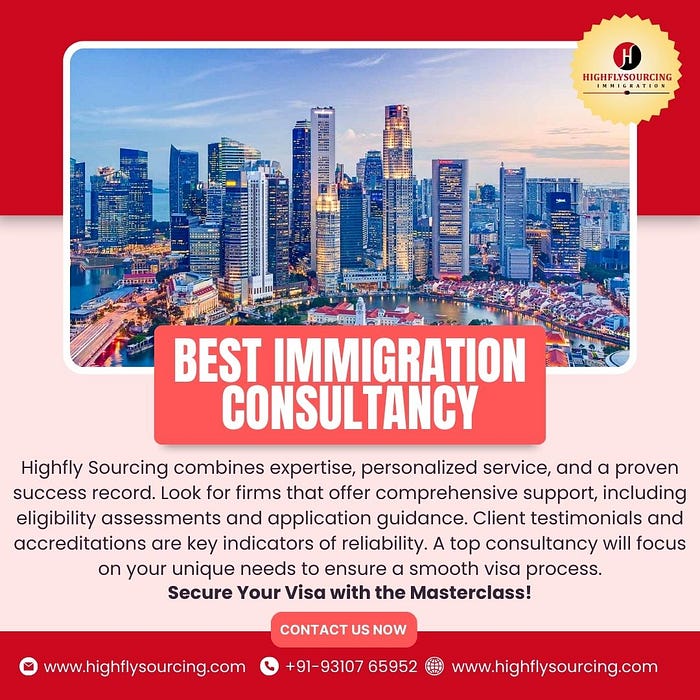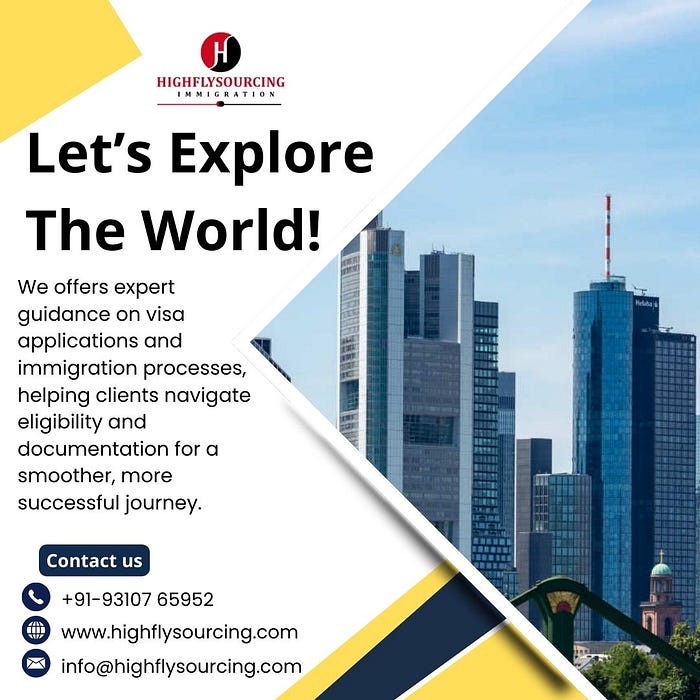
When considering the opportunity to work abroad, understanding the complexities of visa sponsorship is crucial. Different countries offer various pathways for foreign nationals to work legally, and one of the most important distinctions in this process is the type of work visa sponsorship. The two primary categories of work visas are employer-sponsored visas and self-sponsored visas. Both have their own sets of requirements, benefits, and challenges. In this article, we will compare these two visa categories and explore how immigration consultancy can provide valuable assistance in navigating the complexities of these visa processes.

Employer-Sponsored Work Visas
An employer-sponsored visa is a type of work visa where a foreign national is sponsored by an employer in the destination country. This is the most common type of work visa and typically involves an employer offering a job to a foreign worker and then applying to the government for the worker’s visa approval.
Key Features of Employer-Sponsored Visas:
- Job Offer Requirement: The foreign national must have a confirmed job offer from a company that is eligible to sponsor foreign workers. Without the offer, the application process cannot proceed.
- Employer Responsibility: The sponsoring employer has a significant role in the visa process. They must demonstrate that they were unable to find a local candidate for the job, proving that the foreign worker is essential for the position. This can involve advertising the position locally and providing evidence of efforts to hire domestically.
- Limited Flexibility: The visa is typically tied to the employer, which means the foreign worker cannot easily change jobs or employers. If the worker leaves the employer or the employer terminates the contract, the visa may be revoked.
- Temporary or Permanent: Employer-sponsored visas can be either temporary or permanent. Some countries offer a pathway to permanent residency after a certain period of employment under the employer-sponsored visa.
- Labor Market Testing: In many cases, especially for highly skilled positions, the employer must prove that there is a shortage of local candidates with the necessary skills to fill the position.
- Documentation and Approval: The employer is usually responsible for submitting the necessary documents to the immigration authorities. This might include proof of business operations, financial stability, and job descriptions.
Common Employer-Sponsored Visa Programs:
- United States: H-1B visa for specialized workers, L-1 for intra-company transferees.
- United Kingdom: Tier 2 (General) visa for skilled workers.
- Australia: Temporary Skill Shortage (TSS) visa, Subclass 482.
- Canada: Temporary Work Permit, typically requiring a Labor Market Impact Assessment (LMIA).
Pros of Employer-Sponsored Visas:
- Job Security: Once the visa is granted, the worker has legal permission to work for the specific employer, providing job security.
- Pathway to Permanent Residency: In many countries, employer-sponsored visas offer a pathway to permanent residency after several years of working with the sponsoring employer.
- Employer Support: The sponsoring employer often provides support in the visa application process, which can simplify the paperwork and reduce the chances of a denial.
Cons of Employer-Sponsored Visas:
- Limited Mobility: The foreign worker is typically tied to one employer. Changing employers or industries can be challenging unless the visa allows for job transitions.
- Employer Dependence: The success of the visa application is largely in the hands of the employer. If the employer is unwilling or unable to sponsor the worker, the visa cannot proceed.
- Lengthy Approval Process: Some employer-sponsored visa processes, such as the H-1B in the U.S., can take several months, and applicants might face delays or a cap on the number of visas issued.
Self-Sponsored Work Visas
A self-sponsored visa, also known as an independent or entrepreneur visa, allows foreign nationals to apply for work authorization without the need for a specific employer to sponsor them. Instead, applicants must prove they meet certain criteria, such as having a job offer or establishing their own business in the destination country.
Key Features of Self-Sponsored Visas:
- No Employer Requirement: The applicant does not need a job offer from an employer to apply. Instead, they can self-sponsor by establishing a business or meeting other requirements specified by the immigration authorities.
- Entrepreneurship or Freelance Work: Many self-sponsored visas are designed for entrepreneurs, business owners, and freelancers who want to start their own company or work independently in the country. Some programs also allow highly skilled individuals, such as researchers or tech experts, to apply without a specific employer.
- Business Plan or Financial Requirements: Applicants for self-sponsored visas may need to submit a business plan or proof of sufficient funds to support themselves while they establish their business or career in the country. This often includes demonstrating that the applicant’s business will benefit the local economy.
- Flexibility: Self-sponsored visas often allow for greater flexibility in terms of work location and the types of employment. The visa holder can generally work for multiple clients or pursue different entrepreneurial endeavors without the same restrictions tied to employer-sponsored visas.
- Long-Term Residency Pathways: In some countries, self-sponsored visas can offer a path to permanent residency or citizenship after a certain period. This is especially true for those who successfully establish a profitable business or contribute to the economy in significant ways.
Common Self-Sponsored Visa Programs:
- United States: O-1 visa for individuals with extraordinary abilities.
- United Kingdom: Innovator visa for entrepreneurs looking to set up a business.
- Australia: Business Innovation and Investment visa.
- Canada: Start-Up Visa for entrepreneurs with innovative business ideas.
Pros of Self-Sponsored Visas:
- Greater Flexibility: There are fewer restrictions on changing jobs or working with different clients or businesses, making these visas ideal for freelancers or entrepreneurs.
- Independence: The applicant is not dependent on an employer for sponsorship, which gives them more control over their career and work-life balance.
- Potential for High Rewards: Entrepreneurs who successfully launch businesses in foreign countries can reap significant rewards, including financial success and a route to citizenship.
Cons of Self-Sponsored Visas:
- High Initial Requirements: Many self-sponsored visa programs require significant initial investment, proof of a viable business idea, or other financial guarantees. This may not be accessible to everyone.
- Uncertainty: The path to permanent residency or citizenship is often more uncertain and complex for self-sponsored visa holders, especially if their business or freelance activities do not succeed.
- Lengthy Processing Times: Like employer-sponsored visas, self-sponsored visa applications can take time to process, and there are often no guarantees of approval.
The Role of Immigration Consultancy
Navigating the visa application process, whether employer-sponsored or self-sponsored, can be complex, especially with the varying requirements, documentation, and regulations across different countries. Immigration consultancy provide professional guidance to help streamline the process, increase the chances of success, and ensure compliance with all legal requirements.
How Immigration Consultancy Can Help:
- Expert Advice: Immigration consultants are well-versed in the intricacies of visa requirements, including eligibility criteria, necessary documents, and processing timelines. They can offer personalized advice on which visa category is most suitable based on the applicant’s qualifications and goals.
- Document Preparation: Immigration consultants can assist with gathering and preparing the necessary documentation for visa applications. This includes reviewing business plans for self-sponsored visas or ensuring that the employer provides all required evidence for an employer-sponsored visa.
- Application Submission: Consultants can guide applicants through the application process, ensuring that all forms are correctly filled out and submitted. They may also track the progress of the application and handle any issues or inquiries from immigration authorities.
- Increase Chances of Success: Due to their experience and expertise, immigration consultants can help applicants avoid common pitfalls and mistakes that might lead to delays or denials, thus improving the likelihood of a successful visa application.
- Ongoing Support: Once the visa is granted, immigration consultants can continue to provide support, such as advising on visa renewals, extensions, or transitioning from a temporary work visa to permanent residency.
- Post-Visa Services: Immigration consultants often assist with post-arrival services such as help with settlement, understanding local laws, and ensuring that the visa holder is in full compliance with the conditions of their visa.

Conclusion
Whether you are pursuing an employer-sponsored visa or a self-sponsored visa, understanding the nuances of each option is essential for making the right choice for your career and long-term plans. Employer-sponsored visas tend to offer more stability but come with limitations tied to specific employers, while self-sponsored visas provide more flexibility, especially for entrepreneurs or highly skilled individuals. In both cases, working with an experienced immigration consultancy can significantly ease the process, helping you navigate the complexities of visa applications and ensuring that your path to working abroad is as smooth as possible.
If you have concerns about your immigration process or need assistance with immigration matters, contact us by visiting our website or mail us on info@highflysourcing.com for expert guidance and support tailored to your situation. Feel free to reach out to us for personalized advice and support on your journey.







